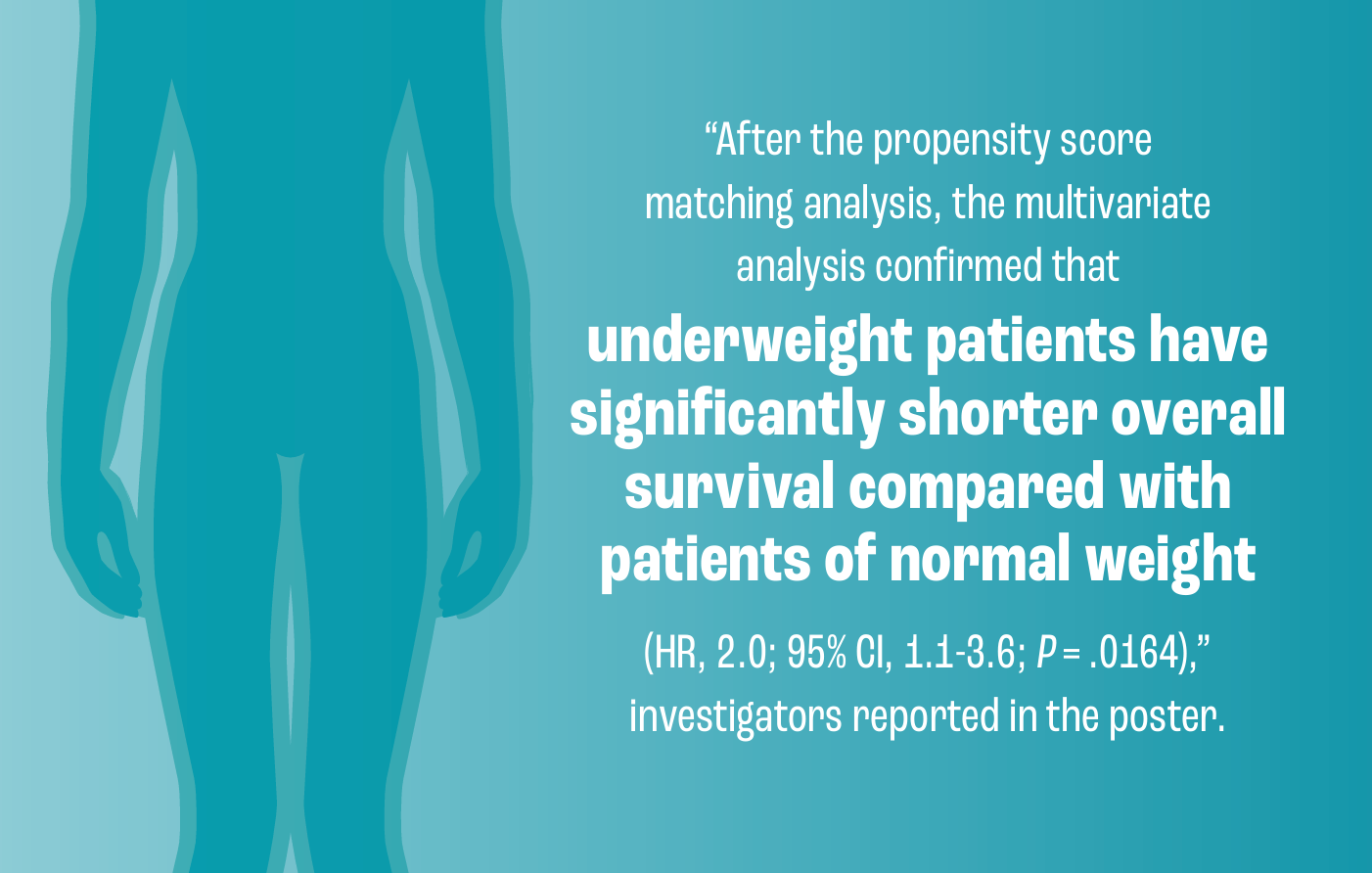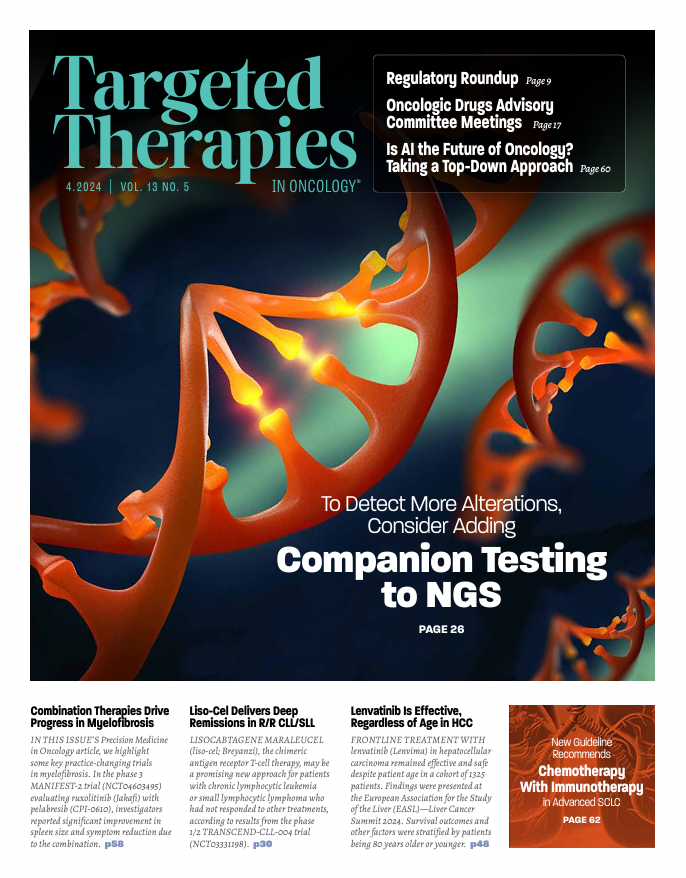BMI Affects Survival Probability With Atezolizumab Plus Bevacizumab in HCC
In the frontline, patient body mass index plays a prognostic role when using atezolizumab plus bevacizumab vs lenvatinib for patients with advanced hepatocellular carcinoma.

Patient body mass index (BMI) plays a prognostic role when using atezolizumab (Tecentriq) plus bevacizumab compared with lenvatinib (Lenvima) for patients with advanced hepatocellular carcinoma (HCC) in the first line. Investigators noted that no prognostic effect was observed in patients treated with lenvatinib. These findings were presented in a poster at the European Association for the Study of the Liver (EASL) Liver Cancer Summit 2024.
For patients receiving atezolizumab plus bevacizumab, both OS (P = .0083) and progression-free survival (P = .0283) dropped substantially in underweight patients in the first 10 to 20 months of treatment. Survival curves were estimated using the Kaplan-Meier product-limit estimator. The role of stratification factors was analyzed with log-rank tests. “After the propensity score matching analysis, the multivariate analysis confirmed that underweight patients have significantly shorter overall survival [OS] compared with patients of normal weight [HR, 2.0; 95% CI, 1.1-3.6; P = .0164],” investigators reported in the poster.
The response rate for underweight patients receiving the combination therapy was between 5% and 10% compared with underweight patients receiving lenvatinib, which was over 30%. Overall, regardless of weight, patients included in the analysis receiving lenvatinib showed a higher response rate of 30% or higher compared with patients receiving atezolizumab plus bevacizumab. Patients who were either normal weight or overweight receiving atezolizumab plus bevacizumab showed a response rate of approximately 29% and 26%, respectively.
“Patients were classified according to World Health Organization standards as underweight if BMI was less than 18.5 kg/m2 and nonunderweight if BMI was 18.5 kg/m2 or greater. In the nonunderweight group, patients were further subclassified as overweight if BMI was greater than 24.9 kg/m2 and normal weight if BMI was between 18.5 kg/m2 and 24.9 kg/m2,” study investigators stated in the poster.
The study consisted of 2 cohorts: patients in cohort A received atezolizumab plus bevacizumab (n = 826) compared with cohort B with patients receiving lenvatinib (n = 466). Patients were then categorized by weight in each cohort. In cohort A there were 510 patients with a normal weight, 52 that were underweight, and 264 that were overweight. For cohort B there were 256 patients with normal weight, 26 that were under weight, and 183 that were overweight.
The primary objective of the study was to evaluate the prognostic and predictive impact of BMI in patients affected by advanced or intermediate HCC from a multicenter international study group. Most patients in both cohorts were male and of normal weight (80% vs 75%, respectively). In cohort A there were 34 underweight patients who were older than 70 years and 18 who were younger. In cohort B there were 14 underweight patients older than 70 years and 12 who were younger.
In both cohorts, combination vs monotherapy, among patients with normal weight and BCLC-C stage, there were 61% vs 41% and 69% vs 69% underweight patients, whereas overweight patients accounted for 55% vs 61%, respectively. For patients with normal weight and BCLC-B stage, the proportions were 39% vs 59%, 31% vs 31% for underweight, and 45% vs 39%, respectively, for overweight patients.
Generally patients who are overweight have a negative prognostic factor in the long term, investigators explained. However, the role of BMI in the short term and midterm for advanced tumors has been unclear, prompting the analysis.
REFERENCE:
1. Cornara N, Rimini M, Tada T, et al. Impact of body mass index on the prognosis of unresectable HCC patients receiving first line lenvatinib or atezolizumab plus bevacizumab. Presented at: EASL Liver Cancer Summit 2024; February 22-24, 2024; Rotterdam, Netherlands. Abstract PO2-10. Date accessed March 5, 2024. https://vmx.m-anage.com/easl/lcs2024/en-GB/ presentation/600225

Leon-Ferre Explores Targeting of PIK3CA Alterations in ER+ Breast Cancer
July 24th 2024During a live Community Case Forum event in partnership with the Minnesota Society of Clinical Oncology, Roberto A. Leon-Ferre, MD, discussed drugs targeting PIK3CA alterations in patients with ER+ metastatic breast cancer.
Read More
George Explores Impact of Risk Status With Cabozantinib/Nivolumab in Advanced RCC
July 19th 2024During a Case-Based Roundtable® event, Daniel George, MD, discussed the results of the CheckMate 9ER trial across favorable, intermediate, and poor risk groups in patients with advanced renal cell carcinoma.
Read More
Depth of Response With Quadruplet Regimens Considered in Newly Diagnosed Multiple Myeloma
July 18th 2024During a Case-Based Roundtable® event, Timothy Schmidt, MD, and participants discussed treatment selection for a 54-year-old patient with transplant eligible R-ISS stage 2/R2-ISS stage 3 IgG-κ myeloma.
Read More
Rossetti Reviews Myelofibrosis Risk Stratification and Outcome Data for Pacritinib
July 17th 2024During a Case-Based Roundtable® event, James M. Rossetti, DO, discussed the role of risk scoring and stratification tools and treatment for a patient with declining hemoglobin and platelet counts due to primary myelofibrosis.
Read More